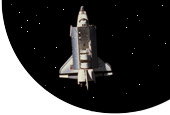| Last-minute fix for shuttle radio glitch
Conflicting frequencies could have interfered with emergency procedures
http://www.msnbc.msn.com/id/8553070/
By James Oberg, NBC News space analyst // Special to MSNBC
Updated: 1:30 p.m. ET July 12, 2005
HOUSTON - As NASA's return to flight draws closer, engineers at the Kennedy Space Center in Florida have been discovering and resolving a torrent of "loose ends" involving the shuttle launch system. One of the most dramatic fixes involved a potential threat to the system that allows ground controllers to blow up the shuttle's rocket boosters if the spacecraft veers uncontrollably toward a populated region.
The problem and the fix were detailed in documents supplied to MSNBC.com by members of the shuttle launch team on condition of anonymity — and on Tuesday, a NASA official discussed the issue openly in response to reporters' questions.
A couple of months ago, NASA engineers found that a recently installed mobile radio system could interfere with the frequency for the range-safety system that would issue an auto-destruct command, test director Jeff Spaulding said. For this week's scheduled Discovery launch, team members working within the launch danger zone have been issued walkie-talkies tuned to a different frequency, he said.
Spaulding said the interference could have affected communications within 1 to 2.6 miles of the launch site, depending on the strength of the radio signal.
He downplayed the issue during Tuesday's news conference. "It's a very specific concern, and it's a very small concern," Spaulding said.
However, in private e-mail communications with MSNBC.com, another member of the launch team was more worried. Two weeks ago, before the workaround was found, the source wrote, "Technically we are no-go."
The source expressed surprise that the problem was discovered so late in the launch preparation: "Odd that this frequency conflict wasn't identified until now," he said in the e-mail.
Internal NASA documents showed that transmissions from the launch site's mobile radio system, which had been installed after the loss of the shuttle Columbia, could interfere with commands issued from the U.S. Air Force's Range Operations Control Center at Cape Canaveral Air Station, known as the ROCC. By law, the Air Force is responsible for ensuring public safety during all launches from Florida's Space Coast.
If the shuttle, with its thousands of tons of structure and fuel, lost control and turned toward the coast, the controllers at the ROCC would have to make the grim decision to trigger explosive charges in the solid-rocket boosters. The astronauts on board the shuttle would most likely die, but hundreds or thousands of lives would be saved on the ground.
In an internal NASA document dated July 8, shuttle launch director Mike Leinbach said the interference problem was discovered after a launch-pad test of Discovery's external fuel tank in May.
Leinbach emphasized that there was no concern about the "inadvertent arming and firing" of the explosive charges on the boosters. Instead, engineers were worried that the radios could interfere with a destruct command and prevent the firing of the charges in an emergency.
Giving launch site workers different radios was just one part of the short-term fix, according to the internal documents and MSNBC's source. NASA also made arrangements to reduce the number of channels used for communications during the critical period surrounding launch. If a "real contingency" arises, "hopefully the deleted frequencies can be quickly restored," the source wrote.
Experience has shown that communications problems can arise even in a routine situation. "Some people may not get a frequency when they key their radios, since these frequencies are extremely busy even in a normal launch," the source said.
Leinbach's report said that the lessons learned during Discovery's launch will be incorporated into the plan for the next shuttle launch, currently scheduled for September.
The report said a "long-term solution has yet to be determined," but Spaulding said the frequencies of the mobile radio system could be adjusted to rule out the possibility of interference completely.
James Oberg, space analyst for NBC News, spent 22 years at the Johnson Space Center as a Mission Control operator and an orbital designer. MSNBC.com's Alan Boyle in Cape Canavarel contributed to this story.
|

